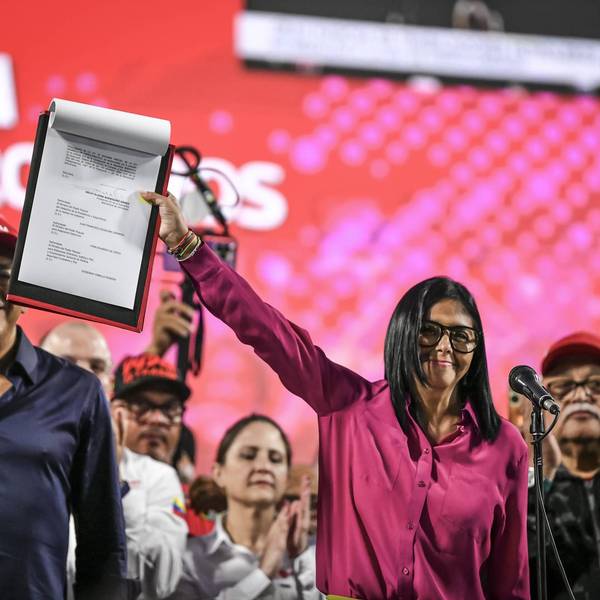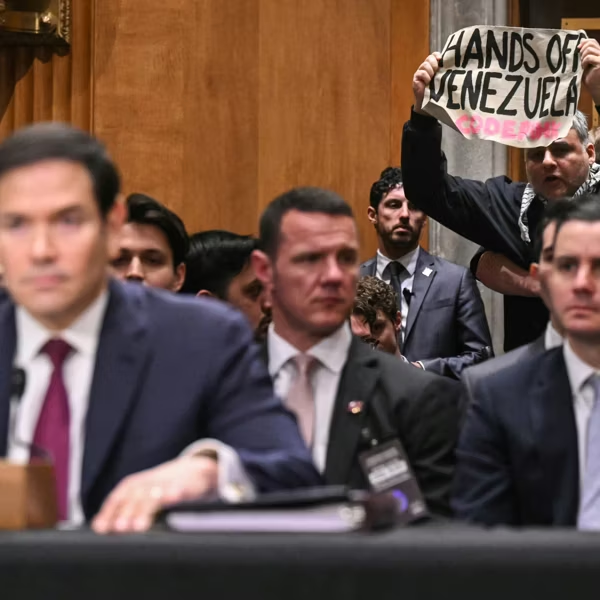
An oil refinery is seen in Puerto La Cruz, Venezuela.
Trump's Threat to Invade Venezuela Is Indeed About Drugs–Oil, That Is
This is not about stopping the flow of dangerous drugs, it is about actually increasing the flow of the dangerous drug some pushers want to keep us all hooked on.
President Donald Trump’s saber-rattling about potential military action in Venezuela is indeed about drugs, but not cocaine. It is about a far more dangerous drug that former President George W. Bush admitted (in his 2006 State of the Union address) the US is addicted to—oil.
Venezuela has the largest proven oil reserves in the world—300 billion barrels—even larger than reserves in Saudi Arabia. Mr. Trump and his oil industry friends may imagine that by deposing President Nicolas Maduro and installing a friendly government there, the US would have unlimited access to this huge oil reserve, which is five times larger than the proven reserves in the US. Never mind the fact that for any hope of future climate stability, most of this oil needs to stay right where it is, in the ground.
We've seen this tragic play before. The Bush administration justified its disastrous 2003 invasion of Iraq with the pretext that Iraq had weapons of mass destruction which, as it turned out, it didn't. And as US Central Command commander General John Abizaid admitted about the Iraq war at the time: “Of course it’s about oil, it’s very much about oil, and we can’t really deny that.” The invasion killed tens of thousands of people, mostly civilians, and destabilized the broader Middle East region for years.
And now here we go again. A similar pretext—this time “drug interdiction”—is being used to justify a potential US invasion and regime change in Venezuela. But this is not about stopping the flow of dangerous drugs, it is about actually increasing the flow of the dangerous drug some pushers want to keep us all hooked on—oil. As Colombian President Gustavo Petro recently stated on the US-Venezuela threat: “Oil is at the heart of the matter.”
Instead of admitting their addiction, the damage it causes, and committing to recovery, hard core junkies are always desperate for more supply. It seems Mr. Trump and his oil industry friends are the most dangerous narco-traffickers we need to worry about.
An Urgent Message From Our Co-Founder
Dear Common Dreams reader, The U.S. is on a fast track to authoritarianism like nothing I've ever seen. Meanwhile, corporate news outlets are utterly capitulating to Trump, twisting their coverage to avoid drawing his ire while lining up to stuff cash in his pockets. That's why I believe that Common Dreams is doing the best and most consequential reporting that we've ever done. Our small but mighty team is a progressive reporting powerhouse, covering the news every day that the corporate media never will. Our mission has always been simple: To inform. To inspire. And to ignite change for the common good. Now here's the key piece that I want all our readers to understand: None of this would be possible without your financial support. That's not just some fundraising cliche. It's the absolute and literal truth. We don't accept corporate advertising and never will. We don't have a paywall because we don't think people should be blocked from critical news based on their ability to pay. Everything we do is funded by the donations of readers like you. Will you donate now to help power the nonprofit, independent reporting of Common Dreams? Thank you for being a vital member of our community. Together, we can keep independent journalism alive when it’s needed most. - Craig Brown, Co-founder |
President Donald Trump’s saber-rattling about potential military action in Venezuela is indeed about drugs, but not cocaine. It is about a far more dangerous drug that former President George W. Bush admitted (in his 2006 State of the Union address) the US is addicted to—oil.
Venezuela has the largest proven oil reserves in the world—300 billion barrels—even larger than reserves in Saudi Arabia. Mr. Trump and his oil industry friends may imagine that by deposing President Nicolas Maduro and installing a friendly government there, the US would have unlimited access to this huge oil reserve, which is five times larger than the proven reserves in the US. Never mind the fact that for any hope of future climate stability, most of this oil needs to stay right where it is, in the ground.
We've seen this tragic play before. The Bush administration justified its disastrous 2003 invasion of Iraq with the pretext that Iraq had weapons of mass destruction which, as it turned out, it didn't. And as US Central Command commander General John Abizaid admitted about the Iraq war at the time: “Of course it’s about oil, it’s very much about oil, and we can’t really deny that.” The invasion killed tens of thousands of people, mostly civilians, and destabilized the broader Middle East region for years.
And now here we go again. A similar pretext—this time “drug interdiction”—is being used to justify a potential US invasion and regime change in Venezuela. But this is not about stopping the flow of dangerous drugs, it is about actually increasing the flow of the dangerous drug some pushers want to keep us all hooked on—oil. As Colombian President Gustavo Petro recently stated on the US-Venezuela threat: “Oil is at the heart of the matter.”
Instead of admitting their addiction, the damage it causes, and committing to recovery, hard core junkies are always desperate for more supply. It seems Mr. Trump and his oil industry friends are the most dangerous narco-traffickers we need to worry about.
- Colombian President Petro Says Venezuela Oil 'At Heart' of Trump Aggression ›
- Maduro Says US Pointing '1,200 Missiles' at Venezuela After Trump Sends More Warships ›
- Trump’s Venezuela Drug War Gambit and the Militarization Playbook at Home ›
- US Deploys Warships to Venezuelan Coast, Raising Fears of Another 'Regime Change' War ›
- Trump Administration Has ‘Made the Decision to Attack Military Installations Inside Venezuela’: Report ›
- 'Venezuela, for the American Oil Companies, Will Be a Field Day,' Says US Lawmaker Pushing Invasion ›
- Top Brazilian Official Warns Trump of 'Vietnam-Style' Regional Conflict If He Attacks Venezuela | Common Dreams ›
- Opinion | Trump's Oil Piracy Shows Why the Push for Renewable Energy Is the Push for Peace | Common Dreams ›
- Opinion | The Venezuela Escalation Ignores a Long History of US Hypocrisy on Drugs | Common Dreams ›
- Opinion | The US Must Stop Pointing Fingers and Admit: We Are the Bad Guys | Common Dreams ›
President Donald Trump’s saber-rattling about potential military action in Venezuela is indeed about drugs, but not cocaine. It is about a far more dangerous drug that former President George W. Bush admitted (in his 2006 State of the Union address) the US is addicted to—oil.
Venezuela has the largest proven oil reserves in the world—300 billion barrels—even larger than reserves in Saudi Arabia. Mr. Trump and his oil industry friends may imagine that by deposing President Nicolas Maduro and installing a friendly government there, the US would have unlimited access to this huge oil reserve, which is five times larger than the proven reserves in the US. Never mind the fact that for any hope of future climate stability, most of this oil needs to stay right where it is, in the ground.
We've seen this tragic play before. The Bush administration justified its disastrous 2003 invasion of Iraq with the pretext that Iraq had weapons of mass destruction which, as it turned out, it didn't. And as US Central Command commander General John Abizaid admitted about the Iraq war at the time: “Of course it’s about oil, it’s very much about oil, and we can’t really deny that.” The invasion killed tens of thousands of people, mostly civilians, and destabilized the broader Middle East region for years.
And now here we go again. A similar pretext—this time “drug interdiction”—is being used to justify a potential US invasion and regime change in Venezuela. But this is not about stopping the flow of dangerous drugs, it is about actually increasing the flow of the dangerous drug some pushers want to keep us all hooked on—oil. As Colombian President Gustavo Petro recently stated on the US-Venezuela threat: “Oil is at the heart of the matter.”
Instead of admitting their addiction, the damage it causes, and committing to recovery, hard core junkies are always desperate for more supply. It seems Mr. Trump and his oil industry friends are the most dangerous narco-traffickers we need to worry about.
- Colombian President Petro Says Venezuela Oil 'At Heart' of Trump Aggression ›
- Maduro Says US Pointing '1,200 Missiles' at Venezuela After Trump Sends More Warships ›
- Trump’s Venezuela Drug War Gambit and the Militarization Playbook at Home ›
- US Deploys Warships to Venezuelan Coast, Raising Fears of Another 'Regime Change' War ›
- Trump Administration Has ‘Made the Decision to Attack Military Installations Inside Venezuela’: Report ›
- 'Venezuela, for the American Oil Companies, Will Be a Field Day,' Says US Lawmaker Pushing Invasion ›
- Top Brazilian Official Warns Trump of 'Vietnam-Style' Regional Conflict If He Attacks Venezuela | Common Dreams ›
- Opinion | Trump's Oil Piracy Shows Why the Push for Renewable Energy Is the Push for Peace | Common Dreams ›
- Opinion | The Venezuela Escalation Ignores a Long History of US Hypocrisy on Drugs | Common Dreams ›
- Opinion | The US Must Stop Pointing Fingers and Admit: We Are the Bad Guys | Common Dreams ›

